Social Protection
Context
The State of the World’s Cash 2020 report found:
- Working with, through and alongside social protection systems is now considered key to strengthening the humanitarian-development nexus and humanitarians are increasingly active in this space
- Practitioners find that the three biggest challenges to effective linkages are: (i) lack of coordination between the actors involved, (ii) social protection systems are not designed to respond to crises, (iii) humanitarian practitioners lack expertise in social protection
- Critically, there is no ‘one size fits all’ solution to linking CVA and social protection. Trade-offs between efficiency, effectiveness, accountability, and sustainability must be considered to ensure the best outcomes for people living in crisis and depends on context, existing systems, and timeframe. Linking will not always be appropriate and social protection systems may not meet all needs. In many contexts, in the short to medium term at least, humanitarian programming will be required to fill gaps.
Current Priorities
The CALP Network has invested intensely in this thematic area over the last few years. We will continue to work closely with the SPIAC-B Working group on linking humanitarian (cash) assistance and social protection (formerly the Grand Bargain Sub-Workstream on Social Protection) and with the SocialProtection.org platform and the Online Community Social Protection in Crisis Contexts to develop evidence, produce capacity building materials and provide technical support to coordination actors.
Community of Practice
SocialProtection.org hosts a dynamic and collaborative online community of practice (CoP) bringing together individuals from diverse backgrounds interested in expanding social protection in crisis-prone areas. The CoP offers a space to exchange documents, insights, and news in order to progress and learn together. Its inclusive and member-led approach offers organisations and individual members a forum to increase learning and outreach, facilitating the exchange of experiences and expanding knowledge. A discussion group hosted by dgroups.org complements these activities by connecting users rapidly via email.
SPACE
There are a wealth of relevant resources from ‘Social Protection Approaches To Covid-19: Expert Advice’ (SPACE) published in the CALP library.
Featured content

Linking Social Protection and Humanitarian Cash and Voucher Assistance
Report
There is a growing momentum and body of work around the idea of developing stronger links between humanitarian cash and voucher assistance (CVA) and social protection (SP). This Briefing Paper for the CALP Network, based on a literature review, a survey, and interviews, is intended to inform the CALP Network’s overall approach in this area, and subsequently its capacity building and...

Linking Social Protection and Humanitarian Cash
Blog Post
The case for social protection to help people cope with shocks has always been clear and never more obvious than during the current Covid-19 crisis. These issues are currently playing out in real time as governments, donors and aid agencies scramble to find ways to get more help to more people to cope with the economic consequences of illness and lockdown. As the virus starts to take hold in...

Linking Social Protection and humanitarian cash and voucher assistance (CVA) – what do we really know and where to start? Findings from the CALP Network commissioned high level briefing paper at the time of COVID-19
Webinar
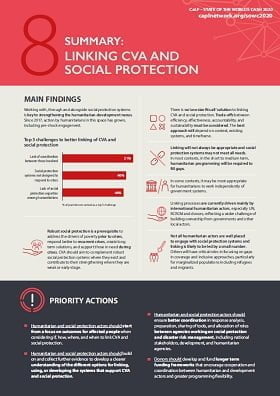
State of the World’s Cash 2020 Chapter 8 summary: Linking CVA and social protection
Report
Longstanding efforts to strengthen links between humanitarian CVA and social protection have been accelerated by the COVID-19 pandemic, with significant progress since the last report. CVA should aim to complement robust social protection systems where they exist and contribute to their strengthening where they are weak or early-stage. This chapter asks: ‘What opportunities and challenges...
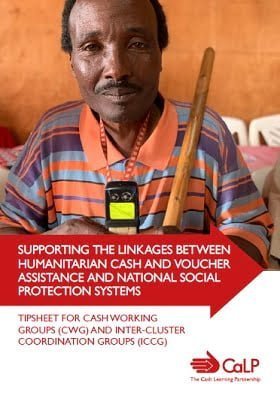
Supporting the Linkages Between Humanitarian Cash and Voucher Assistance and National Social Protection Systems
Report
This tipsheet aims to support country-level coordination efforts to strengthen the engagement between humanitarian coordination groups that implement cash and voucher assistance (CVA) and existing social
protection or disaster risk reduction coordination actors and groups. In particular, it seeks to offers inter-cluster and cash working group coordinators simple practical tips for engaging...
Case Studies

Linking CVA and Social Protection in the MENA Region – Crib sheet
Report
Building linkages between humanitarian cash and voucher assistance (CVA) and social protection (SP) has become an increasingly prominent topic over the past five years and the Middle East and North Africa (MENA) region has been at the centre of this evolution. The objective of this resource set (the crib sheet and 3, soon to be 6, regional case studies) is to ensure that the CALP Network...
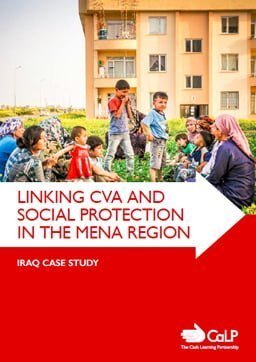
Linking CVA and Social Protection in the MENA Region – Iraq Case Study
Report
Building linkages between humanitarian cash and voucher assistance (CVA) and social protection (SP) has become an increasingly prominent topic over the past five years and the Middle East and North Africa (MENA) region has been at the centre of this evolution. The objective of this resource set (the crib sheet and 3, soon to be 6, regional case studies) is to ensure that the CALP Network...

Linking CVA and Social Protection in the MENA Region – Lebanon Case Study
Report
Building linkages between humanitarian cash and voucher assistance (CVA) and social protection (SP) has become an increasingly prominent topic over the past five years and the Middle East and North Africa (MENA) region has been at the centre of this evolution. The objective of this resource set (the crib sheet and 3, soon to be 6, regional case studies) is to ensure that the CALP Network...
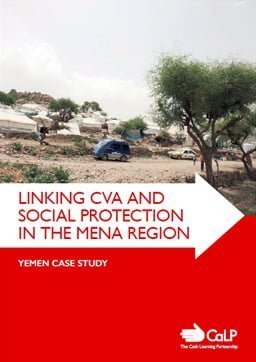
Linking CVA and Social Protection in the MENA Region – Yemen Case Study
Case Study
Building linkages between humanitarian cash and voucher assistance (CVA) and social protection (SP) has become an increasingly prominent topic over the past five years and the Middle East and North Africa (MENA) region has been at the centre of this evolution. The objective of this resource set (the crib sheet and 3, soon to be 6, regional case studies) is to ensure that the CALP Network...

Linking Cash and Voucher Assistance (CVA) and Social Protection – Occupied Palestinian Territories (OPT): Country Summary
Report
This country summary is part of a larger resource set, providing practitioners with examples of different approaches to linking CVA
and social protection.
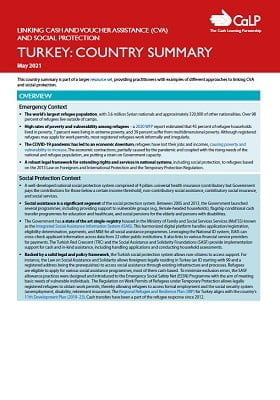
Linking Cash and Voucher Assistance (CVA) and Social Protection – Turkey: Country Summary
Report
This country summary is part of a larger resource set, providing practitioners with examples of different approaches to linking CVA
and social protection.
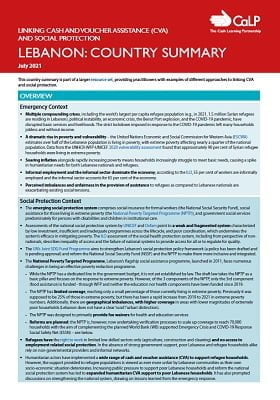
Linking Cash and Voucher Assistance (CVA) and Social Protection – Lebanon: Country Summary
Report
This country summary is part of a larger resource set, providing practitioners with examples of different approaches to linking CVA
and social protection.
Thematic lead
Latest

ESSN Programme Technical Analysis
Report
The Technical Analysis study has been conducted with the aim of referring the individuals in the ESSN Programme beneficiary pool to the livelihoods in terms of its scope and content. With the purpose of increasing beneficiaries’ economic and social resilience and self-sufficiency by reducing their...

Tripartite Agreement Template Between Government, Partner And Financial Service Provider For Provision Of Financial Assistance To Beneficiary Accounts
Guidelines and Tools

Cash transfer Programmes – Impact on Stunting and Financial Inclusion
Report
This report focussed on evidence published in the last ten years (since 2009) on cash transfer programs’ impact on stunting and financial inclusion. The importance of maternal education on stunting emerged from the literature and warrants further investigation, which was outside the scope of this...
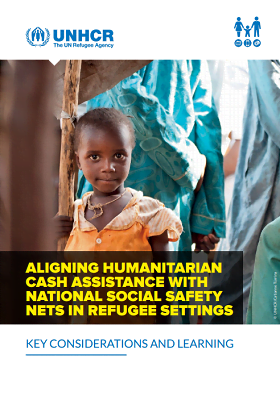
Aligning humanitarian cash assistance with national social safety nets in refugee settings
Report
UNHCR’s research on Aligning Humanitarian Cash Assistance with National Social Safety Nets in Refugee Settings – Key Considerations and Learning provides guidance on how operations have or could progressively align humanitarian cash assistance for refugees to national social safety nets and the...

Minimum Expenditure Basket Harmonization Guidance
Guidelines and Tools
The present Minimum Expenditure (MEB) Guidance is an operational tool for the Refugee Response to inform humanitarian multi sector and/or multipurpose cash assistance to meet food needs and a broader set of essential needs of refugees in Uganda.

Kızılaykart Cash Based Assistance, Information Note
Report
Following the first refugee wave in May 2011, refugees from Syria has continued to seek asylum in Turkey. As a result of the open-door policy between 2011 and 2015, Syrians were welcomed by the Turkish government and obtained legal status under temporary protection. Subsequently, Turkey is hosting more...

Quantitative assessment of the social assistance system of the Kingdom of Eswatini
Report
Analysis of social assistance needs, coverage of needs by existing programs and identification of social assistance gaps in Eswatini

The CALP Network-Asia Pacific Regional Cash Working Group learning event report
Report
On 20-22 May, 27 cash working group (CWG) coordinators and regional technical focal points convened from Afghanistan, Fiji, Indonesia, Laos, Myanmar, Nepal, Pakistan, the Pacific region, the Philippines and Vietnam to share experiences and strengthen coordination between country, regional and global...
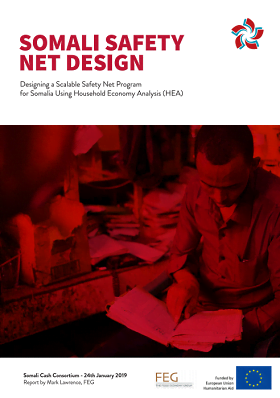
Somali Safety Net Design: Designing a Scalable Safety Net Program for Somalia Using Household Economy Analysis (HEA)
Report
The aim of the study was to use existing household economy analysis (HEA) data to help in the design of a scalable cash-transfer-based safety net program for Somalia. The study made use of a recently completed 15-year (30-season) time series analysis covering 13 livelihood zones in Somalia.
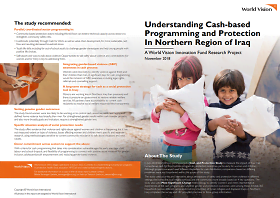
Understanding Cash-Based Programming & Protection in the Northern Region of Iraq-KRI
Report
Cash and Protection Study on impact of CVA (food security focus) on protection outcomes, particularly for women and children.
The study used a survey and interviews about perceptions of safety and protection from violence in different settings: the home, the local neighbourhood, and the community more...
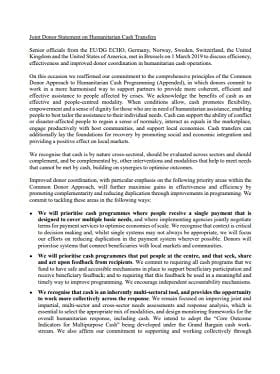
Joint Donor Statement on Humanitarian Cash Transfers
Guidelines and Tools
As part of continuing efforts to strengthen donor coordination on cash, a group of senior officials from major donor agencies (EU/DG ECHO, Germany, Norway, Sweden, Switzerland, the United Kingdom and the United States of America) met in Brussels on 1 March 2019 to discuss shared approaches. Building on...

Rapid Assessment of Markets: World Vision Ecuador
Case Study
Information was collected in 7 cities which were selected because they have the highest Venezuelan population, and there are no other NGOs collecting similar information. Population surveyed corresponds to the Venezuelan population, complemented with interviews conducted in markets and houses where the...
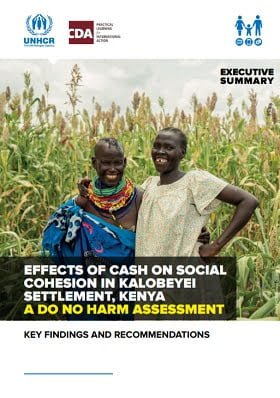
Effects of Cash on Social Cohesion in Kalobeyei Settlement, Kenya – A Do No Harm Assessment – Executive Summary
Report
The document outlines key findings on the effects of cash on social cohesion between refugee and host communities, and some considerations when planning cash assistance. The research was carried out by CDA Collaborative Learning Projects, founder of the Do No Harm Framework. UNHCR’s cash for shelter...
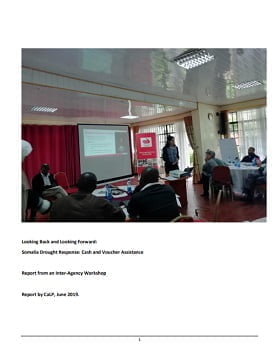
Looking Back and Looking Forward: Somalia Drought Response: Cash and Voucher Assistance
Case Study
This report summarizes the discussions that took place during a one-day learning event on 11th June 2019. The event brought together 27 people from national and international NGOs, the UN, and donors to discuss progress, reflect on cash and voucher (CVA) assistance in Somalia and identify priorities for...
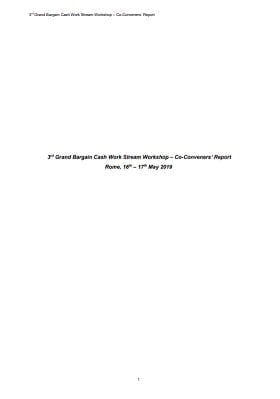
3rd Grand Bargain Cash Work Stream Workshop – Co-Conveners’ Report
Report
The third Grand Bargain (GB) Cash work stream Workshop was held at WFP Headquarters in Rome on 16th-17th May 2019, hosted by WFP and DFID. Over 85 participants attended the workshop, representing 60 donor and humanitarian organisations and multilateral agencies, and including representatives from the...
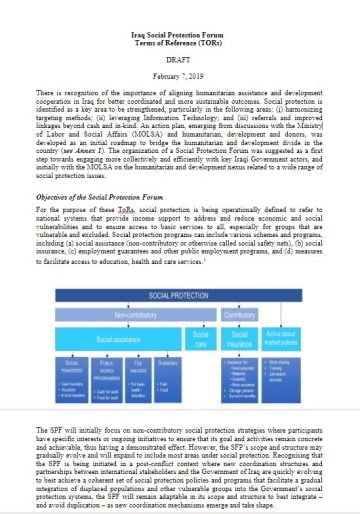
Iraq Social Protection Forum – Terms of Reference (TORs)
Guidelines and Tools
There is recognition of the importance of aligning humanitarian assistance and development cooperation in Iraq for better coordinated and more sustainable outcomes. Social protection is identified as a key area to be strengthened, particularly in the following areas: (i) harmonizing targeting methods;...

Nigeria Cash Working Group (CWG) Humanitarian Social Protection Task Team Meeting
Report
Minutes of the Humanitarian Social Protection Task Team Meeting for the Nigeria Cash Working Group, 28th November 2018
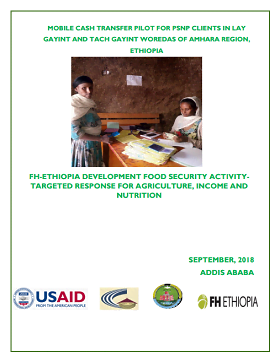
Mobile Cash Transfer for Pilot for PSNP clients, in Ethiopia
Report
The study aimed to understand mobile cash transfer effectiveness and satisfaction level of PSNP clients during the three rounds (January to March) e-payment in 2018 in Amhara Region, Ethiopia, East Africa.
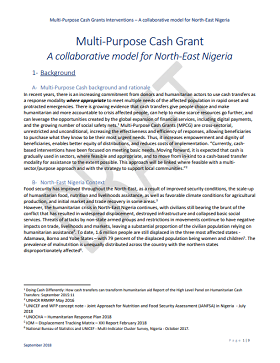
Multi-Purpose Cash Grant – A collaborative model for North-East Nigeria
Report
In recent years, there is an increasing commitment from donors and humanitarian actors to use cash transfers as a response modality where appropriate to meet multiple needs of the affected population in rapid onset and protracted emergencies. There is growing evidence that cash transfers give people...
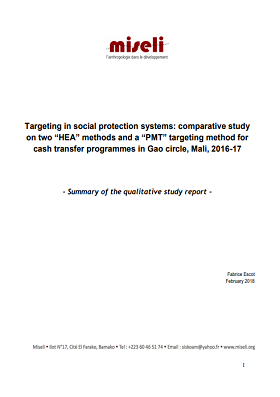
Targeting in social protection systems: comparative study on two “HEA” methods and a “PMT” targeting method for cash transfer programmes in Gao circle, Mali, 2016-17
Report
Social safety nets are becoming a key instrument of povery reduction policies in Sub-Saharan Africa; they are a basic element of social protection systems that include adaptive social protection. Social protection systems aim to target both chronically poor households and those who are slightly better off...

